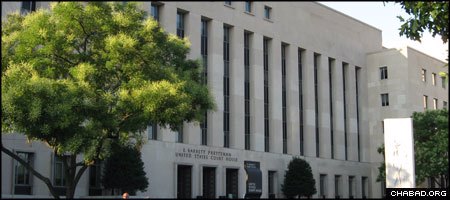A federal judge in Washington, D.C., is issuing an order to Russia insisting that it protect items associated with the library of the Sixth Lubavitcher Rebbe, Rabbi Yosef Yitzchak Schneersohn, of righteous memory, after allegations that about a dozen pages of rare religious manuscripts under the control of the Russian State Military Archives surfaced in Israel.
The temporary restraining order, to be signed Thursday afternoon, will demand that the Russian government secure any documents that had been removed from the collection. A hearing next Tuesday will allow U.S. District Judge Royce Lamberth to consider issuing a preliminary injunction against Russia, essentially a more permanent version of the judgment issued Jan. 22, according to Nathan Lewin, an attorney for Agudas Chasidei Chabad.
In a filing in December, Lewin charged the Russian Federation – which has been involved in litigation over the fate of the library for several years – with not properly safeguarding the collection. Specifically, the filing said that 12 pages handwritten in the 19th century by the Third Rebbe, Rabbi Menachem Mendel, known as the Tzemach Tzedek, were taken to an expert in Jerusalem. The expert, a former university librarian, believed the documents were eventually going to be sold.
The library, which totals 12,000 volumes and 50,000 rare documents, followed the Sixth Rebbe out of Russia when the Soviets expelled him in 1927. They were left in Poland when the Rebbe went to the United States at the beginning of World War II. The Nazi army seized the collection, but it was recovered by the Soviet Army in 1945.
At several points during the Cold War, the issue of the library was a sore point between the Soviet Union and the United States, which hinged some trade measures on the return of the collection to Chabad-Lubavitch.
The latest development comes after a ruling last year gave Agudas Chasidei Chabad the right to sue Russia after proving the exhaustion of all diplomatic and legal avenues there.
During the proceedings this week, the attorneys representing Russia tried to withdraw as counsel, citing lack of communication with and payment from Moscow, said a Chabad official who attended the hour-long court session. The judge “ordered them to stay on the case,” said the rabbi.
According to The Associated Press, Lamberth warned the attorneys of a possible default judgment if the issue of representation is not settled soon.




Start a Discussion